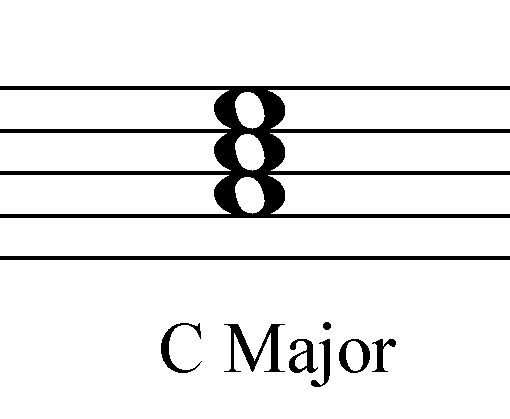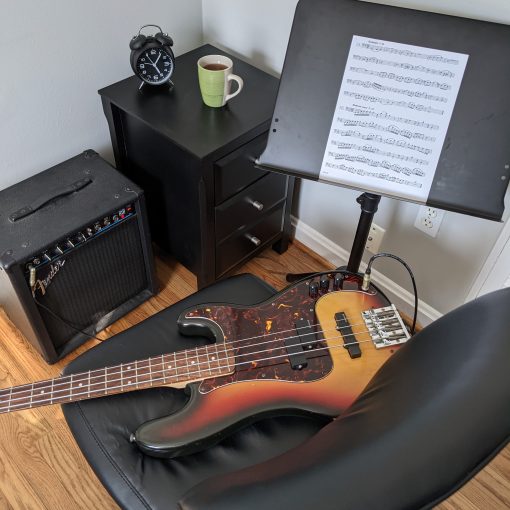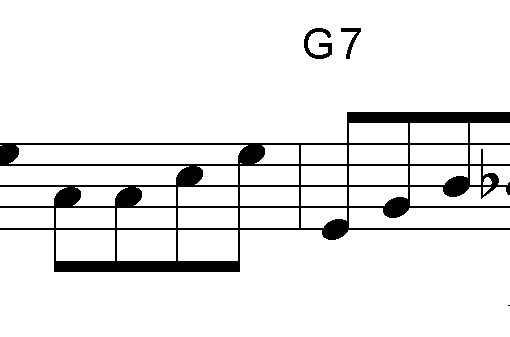Level: all levels
No part of this lesson may be copied, reproduced, or distributed in any form without consent of the author. Copyright © Doug Ross, all rights reserved.
If you’ve already been playing for a while, you have probably come to the realization that bass ain’t as easy as it’s cracked up to be. Playing any instrument well requires a long-term commitment to disciplined practice. Sure, I do know some musicians who never practice, but I don’t know anybody who continues to grow and improve without practicing. Even the people who seem to get away with not practicing by virtue of raw talent or having practiced a lot in years past still need to grow and be challenged. In music and art, you’re either improving or you’re stagnating. There really isn’t any satisfaction in rehashing the same old stuff over and over again. have personally experienced the frustration and wasted effort of bad practice habits, and I’ve also seen many students struggle to keep on track. With the hope of helping you to avoid some potential pitfalls, here are my suggestions for maintaining a healthy practice routine.
1. Every Day is the Only Way
Practice 5-6 days a week. How many hours per day is up to you, but it is the regularity of your practice routine that will get you where you want to go. Practicing 10 hours a day only on the weekends will never yield results like practicing one hour a day all through the week.
2. What Do I Suck At?
This is the first thing I ask myself every time I sit down to practice — the guiding principle for setting my practice priorities. Not a very pleasant question to ponder! Maybe “suck” is too harsh a word, but the idea is to constantly reassess where I’m feeling weakest on my gigs, so I can get my musical skills more into balance. The funny thing is, the answer to this question changes over time. After working on one skill for a while (like reading music for example), it gets better and becomes a relative strength. Then it’s time to start feeling insecure about other things again! There will usually be several items at which I’m “sucking” at any given time. No wisecracks, please.
3. Practicing vs. Goofing Around
Let’s define “practice” as solitary, focused work on musical skills you haven’t yet mastered. That excludes a lot of other valid musical activities: performing, jamming with others, listening to music, playing familiar tunes and licks, rehearsing with a band, and just goofing around with your bass for fun. You can and should do all of these things, but don’t think of them as practice. Resist the temptation to just pick up the bass and play the first thing that comes to mind, because that’s probably not what you need to be working on.
4. Budget Your Time
It’s important to be realistic about this. If you can only consistently do one hour a day or even 30 minutes a day, then plan on that and divide up your hour into small chunks of time for each item on your “suck list”. Even 5 or 10 minutes per subject per day can yield some progress. You should actually calculate how many minutes per subject before you pick up the bass, to make sure everything gets covered each day.
5. Break Before Burnout
If you are practicing for longer stretches of time, it’s important not to run yourself into the ground on any one topic. Remember, we’re working on new, difficult stuff here, so frustration is a real danger. Figure out your own attention span, and make sure that you get in the habit of switching subjects before you start pounding your fists on the music stand or your eyes glaze over. Personally, I have found that 15-minute increments usually work pretty well for me. If I have enough time, I might revisit the same practice item several times in one day, but I won’t make myself practice it for 45 minutes nonstop. A quick trip to the kitchen for a glass of water can help to clear my head, too.
6. First No Time, Then Slow Time
This stuff is new to you. There is no way you can expect yourself to immediately play it as fast as Victor Wooten did on the record. Even Victor had to work it up to that speed. So GO SLOW with any new information. Give yourself the luxury of playing it out of time at first. Once your fingers are making the right moves, then you’re ready to turn on the metronome at a slow setting and add that timekeeping element into the equation. If you’re consistently making mistakes, that means you’re probably going faster than you’re ready to play, or biting off too big a chunk of music, which leads me to my next point…..
7. Isolate the Difficult Bits
Don’t waste time going back to the beginning of that Beethoven piece every time, it’s just half notes and you can already play it! It’s that tricky shift in the middle that keeps tripping you up, so what you need to do is isolate those few bars and work them out. Repeat them a bunch of times, and once that’s solid, make sure you can also nail the transition from the easy part into the hard part. Now you can probably play the whole piece flawlessly!
8. Practice in All 12 Keys and in All Neck Positions
Yes, it’s kind of a drag. And yes, you have to do it. It’s one thing to understand a musical idea conceptually, but it’s something else to truly master it. You don’t really own anything until you can play it in all keys.



